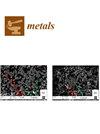在返修和重复使用 MLCC 组件的框架内,多次焊料回流对 Cu6Sn5 金属间化合物形成和 SnAg3.0Cu0.5 焊点分解的影响
IF 2.5
3区 材料科学
Q3 MATERIALS SCIENCE, MULTIDISCIPLINARY
引用次数: 0
摘要
电子组件的再加工和电子元件的再利用是减少电子废物的最有效方法。由于元件和基板的开发都没有考虑到多次使用,因此无铅焊点的完整性如何受到多次回流焊操作的影响,是实施任何再利用战略的关键。因此,在具有纯铜金属化表面的测试印刷电路板(PCB)上焊接了电容值和介质类型(X5R、X7R、Y5V、NP0)不同的各种类型 1206 多层陶瓷电容器(MLCC),以研究多次回流过程中的金属间反应。MLCC 元件一侧的金属化系统由电镀沉积锡覆盖的厚镍膜组成。回流实验使用的是次共晶锡银铜焊料。结果表明,在两个金属化面上都形成了 Cu6Sn5 金属间相,该金属间相随着回流次数的增加而均匀增长。此外,还观察到焊料不断分解成富集析银区和贫化析银区。通过机械剪切实验和四点电容测量,研究了这些微观结构变化对焊点功能的影响。本文章由计算机程序翻译,如有差异,请以英文原文为准。
The Effect of Multiple Solder Reflows on the Formation of Cu6Sn5 Intermetallics and the Decomposition of SnAg3.0Cu0.5 Solder Joints in the Framework of Rework and Reuse of MLCC Components
A rework of electronic assemblies and the reuse of electronic components are the most effective ways to reduce electronic waste. Since neither components nor substrates were developed with the intention of multiple usage, the question of how the integrity of lead-free solder joints is affected by multiple reflow operations is crucial for the implementation of any reuse strategy. Therefore, various types of 1206 multilayer ceramic capacitors (MLCCs) differing in their capacitance value and dielectric type (X5R, X7R, Y5V, NP0) were soldered on test printed circuit boards (PCBs) having a pure Cu-metallization surface in order to investigate the intermetallic reactions during multiple reflows. The metallization system on the MLCC-component side consisted of a thick film of Ni covered by galvanic-deposited Sn. The reflow experiments were conducted using a hypoeutectic SnAgCu solder. The results show the formation of a Cu6Sn5 intermetallic phase on both metallizations, which grows homogeneously with the number of reflows. Moreover, an ongoing decomposition of the solder into Ag-enriched and depleted zones was observed. The effect of these microstructural changes on the functionality of the solder joint was investigated by mechanical shear experiments and electrical four-point capacitance measurements.
求助全文
通过发布文献求助,成功后即可免费获取论文全文。
去求助
来源期刊

Metals
MATERIALS SCIENCE, MULTIDISCIPLINARY-METALLURGY & METALLURGICAL ENGINEERING
CiteScore
4.90
自引率
13.80%
发文量
1832
审稿时长
1.5 months
期刊介绍:
Metals (ISSN 2075-4701) is an open access journal of related scientific research and technology development. It publishes reviews, regular research papers (articles) and short communications. Our aim is to encourage scientists to publish their experimental and theoretical results in as much detail as possible. Therefore, there is no restriction on the length of the papers. The full experimental details must be provided so that the results can be reproduced. Metals provides a forum for publishing papers which advance the in-depth understanding of the relationship between the structure, the properties or the functions of all kinds of metals.
 求助内容:
求助内容: 应助结果提醒方式:
应助结果提醒方式:


